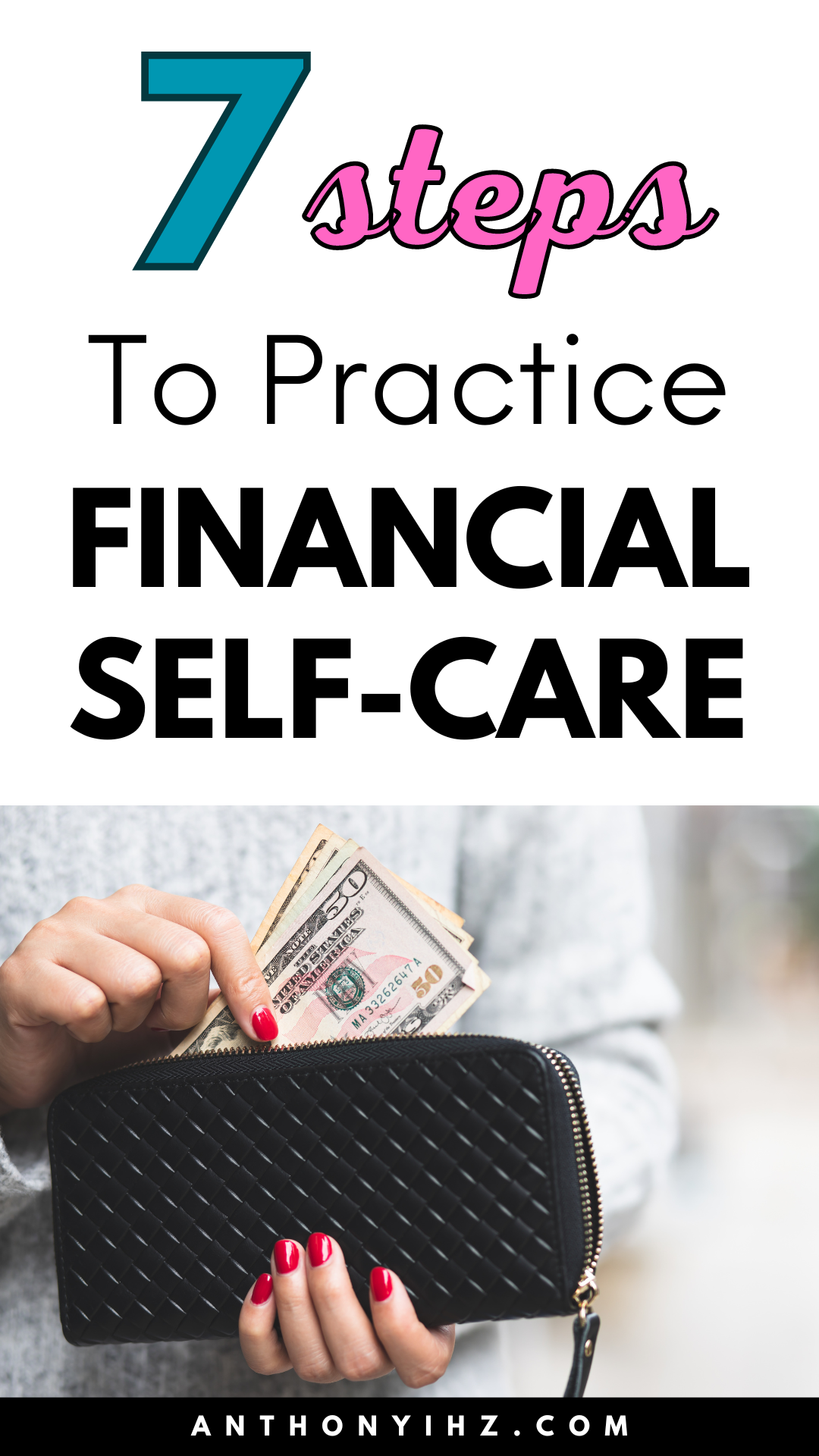
People go for medical checkups occasionally because they need to care for their health and ensure they are living healthy life. But do you think your health is the only thing you should be bothered about? If everything is fine with you health-wise, the next thing you need to prioritize is financial self-care. If my financial situation isn’t looking good, I will probably be mentally stressed until I figure things out.
Clearing your credit card balances, budgeting your salary, and spending sensibly are interesting ways to take good care of your finances.
In this post, I will walk you through the best tips you can rely on for financial self-care. Besides, you would be learning why ensuring that your finances are in good shape is highly important.
What Is Financial Self-Care?
Financial self-care means developing and practicing good money habits that will enable you to achieve your financial goals, avoid debt, and secure your future. Saving money every month, for example, is a good place to start if you want to take financial self-care seriously.
How Do You Take Care Of Yourself Financially?
You can take care of yourself financially by deliberately doing certain things that would improve your financial situation, as well as your financial mindset. By constantly trying to increase your net worth, planning for retirement, and paying off your mortgage, you can take care of yourself financially.
Benefits Of Financial Self-Care
Growing up as a kid, I watched my parents make many unwise decisions that jeopardized our finances as a family. But having grown as an adult and learned a lot about personal finance, I never fail to remind myself how important it is to prioritize financial self-care.
Here are some of the benefits of taking care of yourself financially:
Financial Self-Care Allows You To Plan For The Future
If you are presently facing financial challenges, it’s almost impossible to prepare for the future. When I decided it was time to plan for my retirement, I began working toward clearing all outstanding debts. I took my monthly budget seriously and found extra ways to make more money. By doing all these, I was certainly taking care of my finances. But more importantly, it became easier for me to invest in my future by saving money in a 401(k) account.
Financial Self-Care Reduces Financial Stress
Have you ever had too much credit card debt to pay off? I can guess you probably had sleepless nights and worried a lot about how you would make the payment successfully. This scenario right here is what we call financial stress. The moment you begin to worry too much about money, you are facing financial stress. Hence, it’s important you take certain measures to prevent this from happening.
For example, if you don’t want to pile up too much credit card debt, you need to minimize or completely stop using credit cards. If you notice your paycheck (after taxes) isn’t enough, you should apply for another job to increase your monthly income.
Financial Self-Care Makes It Possible To Offer Support
Being financially successful is more than just being able to afford all you want. You should also be financially stable enough to support others. There are countless NGOs and non-profit organizations scattered across the US needing financial assistance. When you practice financial self-care to the point where you are entirely comfortable, you can decide to offer support to individuals or charity organizations.
Supporting people financially is one of the best ways to give back to humanity. This is probably the reason why a lot of American billionaires and millionaires are philanthropists.
Financial Self-Care Improves Mental Health
There are several things that could affect your mental health. Your financial situation is one of those things. For example, would you be happy if you couldn’t pay for your children’s college education? Of course, you can’t find any sort of happiness in that.
Financial stress takes a toll on your mental health. To prevent this from happening, you have to constantly strive to improve your finances. You can’t instantly become a millionaire by practicing financial self-care. However, as long as your financial situation gradually improves, you are doing just fine.
New And Better Financial Opportunities
Some years ago, I watched a documentary concerning the US stock market. I was so enthusiastic about the opportunity, and I wanted to invest in the market right away. But sadly, I didn’t have the financial backing to make that decision. I didn’t have any savings. All I had was enough money to pay my bills for the month.
This became an important lesson that spurred me to focus on building my finances. I decided I would never miss any more opportunities in the future, and that’s the reality I live in now.
If you don’t want some amazing financial opportunities to elude you, you have to take care of yourself financially. Try as much as you can to boost your net worth. Avoid debt and curb your spending. When the time comes to invest, you might be lucky.

12 Ways To Practice Financial Self-Care
Anyone can learn how to practice financial self-care. It’s not rocket science. You only have to cultivate healthy financial habits that will groom you into a good money manager. Notwithstanding, here are some helpful financial self-care tips I want to share with you:
1. Start Talking About It

Most people don’t like talking about their finances, especially when they aren’t doing too well. Some people even go as far as hiding debt from their partners. This is probably because of the shame that comes with opening up about one’s poor financial situation. However, the truth is that talking about your money problems is one of the major steps to care for yourself financially.
Find a supportive friend and schedule a money date to discuss things like budgeting and paying off debt. You could get moral support and some motivation if you do this.
2. Create Self-Motivating Goals

When you are passionate about a goal, your desire to keep chasing that goal becomes stronger. It’s important to set certain financial goals that would motivate you to take your finances to the next level.
For example, if you decide to go on a vacation in 5 years, it means you have to work hard to make enough money to make that dream a reality. Whether it’s a short-term or long-term goal, it could have a positive impact on your money mindset, challenging you to make better financial decisions.
3. Monitor Your Daily Income And Expenses

Financial self-care hasn’t really begun if you haven’t carefully taken time to keep tabs on your daily income and expenses. You need to determine how much leaves your checking account and how much comes in. If you’re not accountable for how your money is being spent, you can’t manage your finances, let alone improve your money situation.
Personally, I’m used to writing down every major expense I make. This helps me to figure out where my money goes. But more importantly, it reminds me of all the irrelevant expenses I’ve made. Since I want to improve my finances, I’ll ensure I never spend money on those things anymore.
4. Build A Realistic Budget

Budgeting is one of the most common ways to practice financial self-care. Let me ask you this, do you usually have any proper plan for how your salary is spent? If you don’t have one, that’s enough reason why you need to start building a monthly budget.
By budgeting your income, you can itemize all your fixed and variable expenses. A budget would also help you keep good track of your spending.
But more importantly, when building a budget, ensure you are realistic with your budget. What this means is that you shouldn’t overestimate yourself by aiming for too much. As much as you want to curb your spending with a budget, please don’t overdo it because you may end up breaking the budget eventually.
5. Set Up An Emergency Fund

One of the main tips to care for yourself financially is planning for emergencies. Aside from your fixed bills, you also have to prepare for unexpected expenses such as car trouble or medical bills. You can achieve this by building an emergency fund.
Saving around $100 – $500 monthly in a separate savings account is a good way to get started. By the time you have saved up enough money to cover your basic expenses within 3-6 months, you have yourself an emergency fund you can rely on.
Besides, if you need guidance on how to plan for emergencies, here’s a piece that I wrote on building an emergency fund in just 7 steps.
6. Borrow Wisely
Avoiding debt is one of the financial self-care practices you should take seriously. But sometimes, you can’t avoid debt completely. For example, using credit cards puts you in debt. What is important is making sure that you don’t overstretch yourself financially by borrowing too much. You don’t want to be in a debt trap. Except it’s an emergency, don’t borrow money.
Sometimes, you can solve your financial crises without applying for personal loans. If you are finding it hard to pay for your apartment, you could move to a smaller place. Instead of taking a car loan, fix up your current car and make it road-worthy. These are creative ways to avoid borrowing money unnecessarily.
7. Invest In Your Future
Sometimes, the financial stress you feel today is due to the fact that you are worried about what your financial situation will look like in the future. This is why I advise people to invest in a retirement account as early as possible.
Of course, it’s possible you don’t have enough money to make this financial commitment easily. But if you can drastically reduce living costs, you might generate some extra cash to invest in your retirement.
Remember, this is a long-term goal. It’s totally fine to move gradually. You don’t have to contribute a huge amount of money to your 401(k) every month to achieve your goal. Your little contributions over a long period of time would amount to a significant investment.
8. Create And Grow Assets
This is one of the financial self-care examples often practiced by millionaires. Mind you; I’m not saying you must have 7 figures in your checking account before you can take this step. I’ve seen people successfully invest in a peer-to-peer lending marketplace without having a ton of money initially.
Whether you choose to invest in real estate or the stock market, making the right investment will secure your future. When it’s time to retire, your investments will have grown into big assets that spit cash even while you sleep.
9. Spend Wisely

Do you spend emotionally or logically? This is a very important question to answer when trying to practice financial self-care. Emotional spenders tend to buy things impulsively. But when you logically analyze your options rather than allowing your emotions to get in the way, you will spend wisely.
For example, before making a large purchase, make sure you plan for it. Don’t randomly splurge a significant amount of money without including it in your budget. Being careful with your spending will save you from losing money and incurring debts unnecessarily.
10. Make Extra Debt Payments

If you currently have a debt to pay off, making extra payments is an effective strategy that can help you clear your balance faster. This means you should try to pay more than the minimum balance every month.
Extra payments are not compulsory, but due to the peace of mind that comes with paying off your debt earlier, I advise that you make additional payments whenever you can.
Anyone who’s debt-free has the opportunity to manage their finances without feeling any form of pressure or financial stress. You should consider this one of the key tips to practice financial self-care.
11. Minimize Or Stop The Use Of Credit Card
Imagine spending your salary without having to pay off any credit card balance. It would certainly be a satisfying experience. As much as America makes it seem like everyone should use credit cards doesn’t make it the right financial decision for you.
Credit cards can be helpful when you need assistance, but when your spending spirals out of control, the outcome could be very ugly.
I don’t advise you to use credit cards. It’s either you reduce them or cut them out completely. Making this decision for the first time would be difficult, I know. But if you stick with it, you will be thankful eventually.
12. Make More Money

I don’t think anyone can have excess money. There’s always room for more. Elon Musk used to be the richest man in the world but his companies are still making billions of dollars to fund his projects. He’s obviously not tired of making money.
Basically, you need to open your mind to money-making opportunities around you. If you are generating enough money to fund your dreams, chances are that you will live a happier life.
We have discussed budgeting, building an emergency fund, planning for retirement, and investing. But if you don’t have enough money in your bank account, none of these things would make sense. Apparently, making more money is one of the top financial self-care ideas you need to keep in mind.
Final Thoughts On Financial Self-Care
Financial self-care is as important as breathing in oxygen. None of your goals would be feasible if you keep struggling financially. This is why you must wake up every morning and be intentional about solving your money problems. No matter how difficult it gets, you still have a shot at financial success.
Using these tips we discussed, there’s no doubt that you will make the right decision concerning how to manage, save, and invest your money.
Pin this for later!

